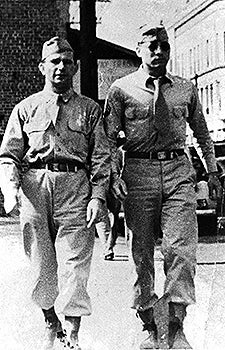For the Record
As a young law student, Frederick Aguirre was in Washington, D.C., in 1970 interning with the U.S. Department of Justice’s Civil Rights Division. An exhibit at the Smithsonian Institution commemorating the 25th anniversary of the end of World War II caught his eye.
Aguirre’s family, who emigrated from Mexico and set down roots in the United States starting in the 1890s, has a long history of military service. His father, two uncles, and 23 cousins served in World War II. Many other family members and friends served in the Korean and Vietnam wars.
“I went to the exhibit with the pride of my family having served in WWII, hoping to see positive signs of the service of our military men, especially Mexican Americans,” said Aguirre, who earned his bachelor’s in history from USC Dornsife in 1968 and is now a California Superior Court judge in Orange County.
As he began walking through the exhibit, Aguirre was pleased to see some minority groups that faced discrimination at home presented as patriotic heroes during their service abroad. Special sections celebrated African American and Japanese American servicemen. But for Latinos who served their country, Aguirre found only a small display on the Zoot Suit Riots of 1943. Then, racial tensions in Los Angeles escalated between on-leave servicemen and Mexican American youth, erupting in three nights of fighting in the streets.
“It angered me,” Aguirre said. “More than 500,000 Latinos served in WWII. We’re a part of the fabric of this country. To be displayed in such a negative and unpatriotic manner, showing Mexican Americans as enemies of the state at our national museum, was egregious.”
Since that moment, a desire to present the full picture of Latinos’ contribution to the military simmered in Aguirre. In the 1990s, Aguirre and his wife Linda Martinez Aguirre, a history teacher whose Mexican American family also had many members serve in WWII and other wars, decided to fill in gaps in the historical record. They founded a nonprofit organization called Latino Advocates for Education (LAE) with their friend Rogelio Rodriguez. Together, they started interviewing Latino veterans they knew through family and friends, documenting their service to the U.S. military.
“We would tell somebody to get us the names and photographs of their loved ones,” Aguirre said. “From there, it snowballed.”
Their research filled three self-published books: Undaunted Courage: Mexican American Patriots of World War II (2004, LAE); Strength and Honor: Mexican Americans in the Vietnam War (2006, LAE); and Freedom Is Not Free: Mexican Americans in the Korean War (2007, LAE). All of the research material and photographs of 2,000-plus veterans profiled in the books are now archived in the Orange County Department of Education’s website “American Patriots of Latino Heritage.”
In addition, LAE launched an annual Veterans Day event in 1996 to honor Latino servicemen at Santa Ana College, which was later held at California State University, Fullerton. Organized entirely by Aguirre, his wife and Rodriguez, the event ran for 15 consecutive years. They brought in Latino Medal of Honor recipients and Latino generals to speak about their experiences. Prominent figures gave speeches and presented veterans with certificates commemorating their service, including then-Gov. Gray Davis, and Rep. Loretta Sanchez. Military vehicles were displayed and bands performed. One year two F/A-18 Hornet fighter jets did a flyover. The Aztec Skydiving team parachuted into the crowd.
Aguirre said that his time at USC Dornsife was significant in shaping his interest in history. He remembers how his professor Doyce Nunis encouraged him to pursue his doctorate in California history.
“I was very impressed by that,” Aguirre said. For a while he considered the idea. But as a self-described “child of the ’60s,” Aguirre was inspired by the civil rights movement and decided to earn his law degree.
He remembers when he listened to Martin Luther King Jr. speak at USC in 1967 at Bovard Auditorium. “I was very moved by it,” Aguirre said.
Now, when Aguirre isn’t consumed with his work in court, he films his interviews with Latino veterans in hopes of making a documentary about their experiences.
“I want to show the political maturation of Latinos after WWII as a result of their service to this country,” he said.
For instance, upon returning from the war a number of Latinos took on leadership roles in politics and public service. One was Edward Roybal, who after returning from his military service in WWII, served on the Los Angeles City Council for 13 years and then in the U.S. House of Representatives for 30 years.

Photo of Superior Court Judge Frederick Aguirre’s father (right) in 1945 in Honolulu while in basic training, which hangs in Aguirre’s judges chambers.
Aguirre’s own father Alfred Aguirre, after returning from serving in WWII, was elected to the Placentia City Council in 1958 — the second-ever Latino elected to a city council in Orange County’s history.
Aguirre keeps a photograph of his father in his judge’s chambers as a reminder of the contribution Latinos have made in the military.
The image shows Alfred Aguirre in uniform in Honolulu, Hawaii, during his basic training in 1945. He’s walking down the street with his best buddy Ruben Abraham. The elder Aguirre, forced to drop out of school at age 14 to support his mother and siblings after the death of his father, went on to join the Army Air Corps of Engineers. His unit built the Kadena Airfield in Okinawa, Japan.
“The image is instructive,” Aguirre said. “Here is a Mexican American kid from segregated schools with a ninth-grade education working as an engineer.
“I am inspired each day seeing this photograph of my father proudly wearing his uniform and serving his country.”